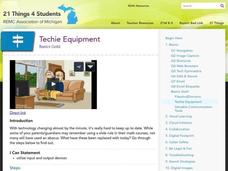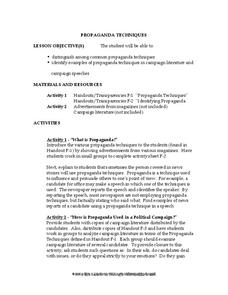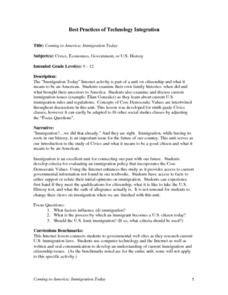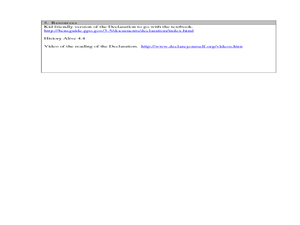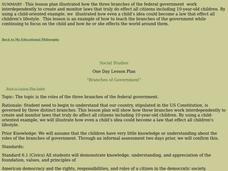Curated OER
Social Studies: Looking at Regions
Quiz your 3rd graders on why we have regions. This regions quiz includes 16 questions on why and how we group areas into regions based on physical features, culture, politics or religion. A class discussion on technology completes this...
Curated OER
Three Little Pigs: Human, Natural and Capital Resources
First and second graders will learn about natural, capital , and human resources through the story The Three Little Pigs. They will listen to the story, write down what they know about straw, wood, and brick, then complete a chart...
Curated OER
Clothes World: Beginning ESL lesson
Take a tour around the world with this ESL presentation about international clothes. From South African tribal wear to Scottish kilts, your English learners will appreciate the vivid pictures and clear country labels for each slide. The...
Curated OER
Peace Education | Wreath or Tree Craft
What is peace and what does it mean to our society? To understand why peace is celebrated and what character traits or concepts relate to the action of peace, learners engage in a discussion, story time, and a craft project. The lesson...
Curated OER
Tic Tac Toe Do's and Don'ts
Fourth graders listen as the counselor reads statements. They receive a tic-tac-toe worksheet and complete it with two different color crayons. Students look at the overhead projector and check their tic-tac-toe game card. They discuss...
Curated OER
Obstacles to Perseverance
What does it mean to persevere. Young historians review the definition of perseverance then brainstorm a list of obstacles colonists and revolutionaries had to overcome during the American Revolution. Using this list, they identify...
Curated OER
Stories of Freedom and Justice: Learning Resources
Pupils are introduce to the topic of nonviolence and civil rights by watching a video. In this stories of freedom activity, students examine the Supreme Court's role in interpreting the U.S. Constitution. Pupils analyze how conflict and...
Curated OER
The League
Students explore the concept of civic virtue in a democratic state. For this democracy lesson, students listen to John F. Kennedy's inaugural speech, read selections on democracy, and discuss the importance of civic rights and...
Curated OER
National Service: Lesson Plan
Students explore and take postions on the concept of mandatory community service. They then debate the issue in class as a learning model.
Curated OER
Government
Second graders run for various offices. They dress up like a politician, pretend to be running for an office, and tell the students why they should vote for him/her. They explain why it is necessary for a community to have a government
Curated OER
The United States Flag
Students discover the meaning and symbolism behind the American flag. In this instructional activity on National symbols, students design a flag for their school, explain the symbolism they used, and distinguish the elements that...
Curated OER
Overcoming Censorship Through Art
Students create an art piece that expresses their opinions while circumventing hypothetical government restrictions in this lesson on art and government censorship. Emphasis is placed upon historical instances of censorship around the...
Curated OER
Anne Frank: Nuremberg Laws
Young scholars research and discuss the Nuremberg Laws and their effect on the Jews during the Third Reich. They participate in role-play activity to see what it feels like to be discriminated against.
Curated OER
Evacuation: The Japanese Americans in World War II
Students examine Japanese internment camps of World War II. In this World War II lesson, students use primary and secondary sources to research the evacuation process and life within the internment camps. Students discuss the racial bias...
Curated OER
"History of My Family"
Learners explore world geography by participating in a family history project. In this U.S.S.R. lesson, students read assigned text regarding the Stalinist era of Russia and the intolerance that thrived there. Learners answer a list of...
Curated OER
Propaganda Techniques
Students recognize and separate various techniques of propaganda. In this propaganda lesson, students read a handout about the various types of propaganda and how it is used ina political campaign.
Curated OER
The New Republic
Students research the Federalists and Anti-federalists. In the lesson on state legislature, students use primary sources to create a brochure and write an essay that illustrates federalist and anti-federalists viewpoints.
Curated OER
Small Steps; Great Journeys
Twelfth graders examine contributions to communities. In this philanthropy instructional activity, 12th graders discuss the quote, "That's one small step for man, one giant leap for mankind." Students identify issues that exist in their...
Curated OER
Government Lesson Plan: Lesson Plan 8
Students analyze the Fourteenth Amendment. They discuss Reconstruction, read the provisions of the Fourteenth Amendment, define the provisions, and in small groups analyze a Supreme Court case that was impacted by the due process clause.
Curated OER
Coming to America: Immigration Today
Students research their own family histories and current U.S. immigration issues, rules, and regulations. They participate in a class discussion, watch a video about a Mexican immigrant's experience, and complete a WebQuest and a worksheet.
Curated OER
Political and Cultural Road to the American Revolution
Learners examine the Declaration of Independence. For this Revolutionary War lesson, students use primary sources to analyze how the creation of the Declaration of Independence lead to the development of the United States as an...
Curated OER
Branches of Government
Students explore the three branches of government. In this government and U.S. history lesson, students listen to a story about a boy who attempts to sponsor a bill to ban cartoons. Students interview three teachers who each represent...
Curated OER
The Three Branches of Government
In this United States government worksheet, students learn about the 3 branches of the government: Executive, Judicial, and Legislative. They then answer 10 questions about what they learned. The answers are on the last page of the packet.
Curated OER
Our Constitutional Connection Lesson 3: To Vote Or Not To Vote? That is the Question!
Students design colorful posters to "get out and vote" after studying the three amendments to the US Constitution that extend voting rights. They analyze the importance of voting to a healthy democracy.



